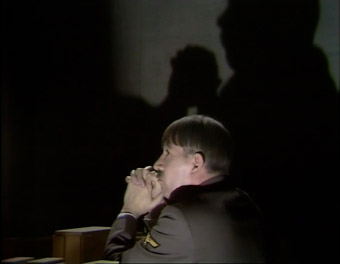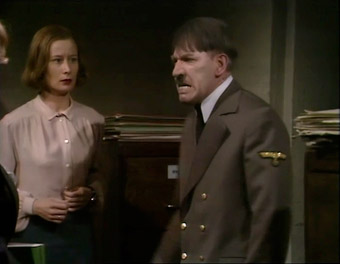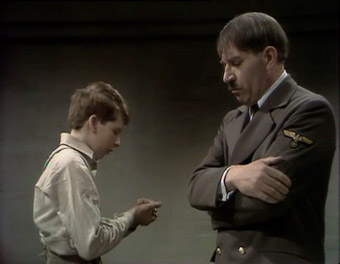| "I believe today that my conduct is in accordance with the will of the Almighty Creator." |
"Who says I am not under the special protection of God?" |
Adolf ('Not Quite The Atheist People Think He Was') Hitler |
It seems a shame – or a marketing coup (depending on which side of the business you see things from) – that a superior German movie about Hitler's last days in a Berlin bunker is more famous for a certain excerpt's myriad appearances on YouTube. Subtitled with whichever subject the sub-titler wishes to air a grievance about, it features the scene from Downfall (or Der Untergang) when Hitler (Bruno Ganz) goes ballistic at the ineptitude of his commanding officers. Each different version is as amusing as its altered subject matter is to the viewer. Of course, German speakers miss out on the hilarity, understanding every word of the spoken dialogue. I am completely ambivalent towards this mashing of media, regretful that such a positive and powerful work could be so easily reduced to childishly subtitled tangential humour and finding something to smile about particularly from the one about troubles in film post-production. That the film informed me of historical facts of which I was unaware is one small reason I enjoyed the work (enjoyment in the sense of "Oh, God. That's awful..." but brilliantly executed and performed). Most of all it was the jaw dropping astonishment at how human beings could behave under certain stressful circumstances.

The exact same subject matter was covered by LWT (or London Weekend Television) in 1973 in a commercial interrupted four-part two hour special written by Vincent Tilsley. Prisoner fans note, Tilsley was the writer that created The Chimes of Big Ben, the series' second episode. The commanding ball of bi-polar, paranoid vehemence, Frank Finlay, played 'The Leader' while a host of British thespians filled in the cast as odious acolytes of Hitler's high command. Both Downfall and The Death of Adolf Hitler are not so much companion pieces as Willy Russell's Blood Brother's brothers; one is dressed in expensive production design with a great deal of movie-level care taken in its execution and the other wears threadbare and basic sets, constantly giving away its studio video origins. What anchors both productions giving them gravitas and meaning are two aspects; one, the facts known of the last days in the bunker (and some of the facts are hard to handle) and two, a towering performance from both leading actors. I've sung Ganz's praises in my earlier review. Now it's the time for Frank Finlay to bask in the swastika spotlight.
OK. Let's accept that this is a dramatization of Hitler's last days and that even the skill of writer Tilsley cannot hope to have tapped in to some 1945 subterranean recording device revealing all that was said and done. But as both movie and TV production have some things in common, we can deduce that most of the scenes are factually based and extrapolated from what was known, what was found at the bunker. After Downfall, I thought I'd (depressingly) been surprised by the horror of the events but Finlay's polarised deterioration uncovers a few fresh levels of disgust as much as that is satisfying entertainment to an audience now and in 1973.
The first aspect of this interpretation that hits you repeatedly between the eyes is that Adolf Hitler must have been more than a paranoid manic depressive. He was perhaps in his last days, a certifiable nut-job, measured for his straitjacket as soon as it was known that the Russians were bound for Berlin. He prowled the underground corridors with enormous dollops of "It's everyone else's fault!-itis". He flew into rages like an eight year old bereft of his slingshot and while this may have been true (Adolf seems to generate that shouty intolerance in impressions, witness Cleese's turn in Fawlty Towers) it does make you feel that one of his commanders should have just happy slapped the bastard, dragged him out of Berlin and left that utter deranged lunatic Goebbels and his insane wife to kill their five children in peace, an act rendered chillingly in Downfall. Mercifully we do not see the deed in the Finlay version. The Leader flies into rages at the drop of a Stormtrooper's helmet and is frustrated faster than a feminist on Top Gear.

Certifiable is also a word one can aim at Eva Braun, Hitler's mistress who, if this production is to be believed, shows a cheerful fatalism that borders on rank insanity. Twenty-three years Hitler's junior, she acts like the personification of a soothing balm, an unguent of unreality with a death wish that is regarded as positively orgasmic. Calling Hitler 'Addy' smacks of unreality but what do I know? She's still convincing saying the enderament. "Accept it," she tells her lover upon hearing that the Russians were just miles away from pulling out Nazism by its dark and deranged roots. It's all an audience can do to likewise accept Braun's serial optimism believing – as she must – in the afterlife so persistent is she about dying with her man. As Eddie Izzard observed in his San Francisco stand up set, their honeymoon was to be a cyanide capsule (Hitler's was a bullet) and being set fire to in a ditch. What a romance that was.
Given the cloud cuckoo-land where Eva lived, it's good to say that Caroline Mortimer makes her a memorable and convincing lovestruck, uh... idiot. And being British, the only real problem I had personally with this production was hearing the suffering of Blondie. Now, I must slightly digress. This wasn't the white haired siren of 'Heart of Glass' fame but the Leader's Alsatian dog that Hitler ordered poisoned. Hearing the dog's awful death throe whines and whimpers, Finlay demands it be shot. Alas, for once in a Nazi's life there is no gun to hand. We also find out that part of Hitler's problem was an unknown reliance on drugs and his subsequent cold turkey. He is, in so many instances, the ultimate pot screaming bloody murder about the dark hue of the kettle.
The rest of the cast acquit themselves admirably. Whether Goerring (Robert Cawdron) was humiliated by Hitler enough that this powerful man was reduced to tears is conjecture at best but it's still a convincing performance. Taking an invidious turn as an ambitious doctor is Ray McNally (the gloriously down to earth PM in Chris Mullin's A Very British Coup). His manoeuvring (having figured out that Hitler is more bi-polar than a sexually anguished bear) is a lesson in toadying towards the ultimate power giver. His phrase "experiments on the Jewish creatures," makes the skin crawl as it should and in only one scene a young McNally makes a lasting impression. And that hair! The bastard lovechild of a Weetabix and a Brillo pad. Of the Jews, he remarks "They are quite like us..." Chilling. Assuming accurate research was done, I still find it hard to believe a board game played by the Goebbels children could have been called "Get The Jew". "She's killed forty-five thousand Jews and she's only seven!" says a proud mother. Maybe I was wrong. Maybe that Goebbels gene pool needed stamping out.

In some ways, Finlay plays Hitler as most of the world perceives King Cnut. Hitler as a Cnut, yes. That works. As you may know, instead of being the idiot who believed in his royal power enough to think he could command the tides to stop and recede, he was quite the opposite. Cnut was wise to show people a royal position did not add up to being all-powerful. Finlay also says that he was "...selected by my master himself to purge this earth of filth." This ridiculous argument thrown at atheists that Hitler did what he did because of his lack of belief is thrown into sharp focus. Hitler believed that he was doing the work of a Christian god. I'll sign off with a great quote which was probably Tilsley's not Hitler's but it's a great example of peeling back a few layers from an historical figure and with some poetry, illuminating his soul...
"Hate is the only fuel of the breadless..."
Framed in TV aspect ratio 4:3, this 1973 television play betrays its studio video origins. It looks perfectly good on a standard definition CRT TV but on a progressive computer monitor there are scores of technical blips (noticeably in the rather contrived "Let's pop open a champagne bottle for each blast of a Russian gun" motif that starts the drama). But no matter. The play's the thing.
The Dolby Digital mono is perfectly serviceable. There are no subtitles nor closed captions.
Alas, not a Frankfurter.
The Death of Adolf Hitler is a damn fine drama with solid and unnerving central performances. Yes, it shows its age but if you wanted a fascinating companion piece to Downfall, Finlay's your Führer. Recommended.
|